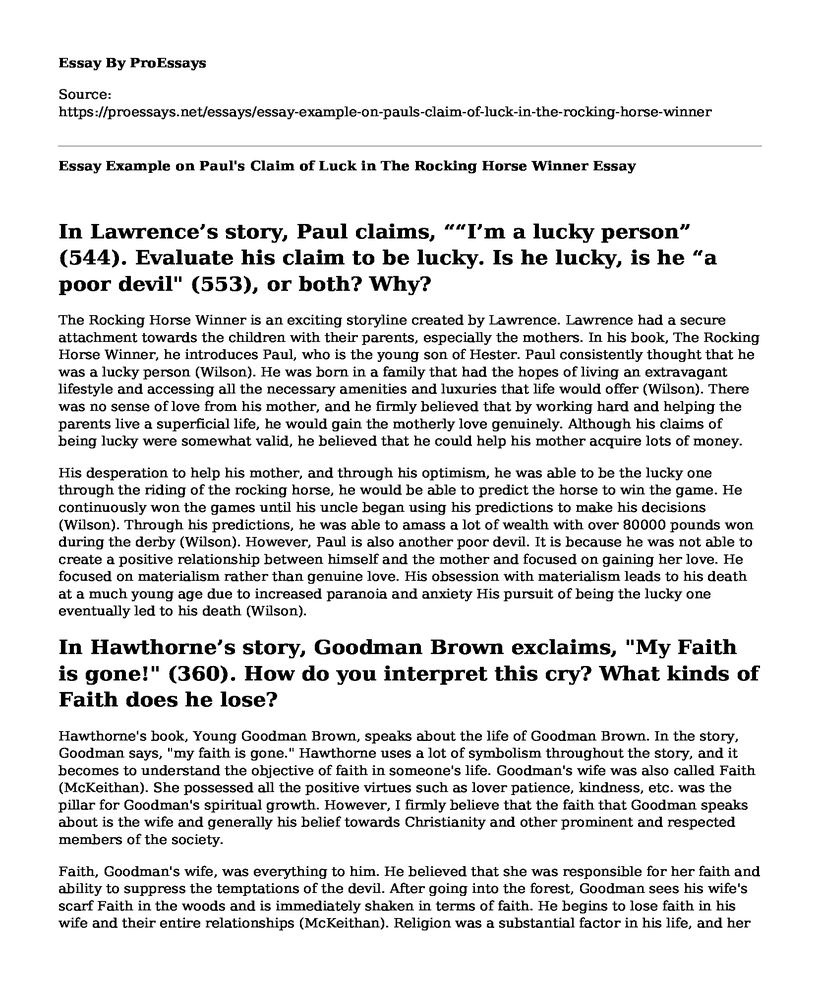In Lawrence’s story, Paul claims, ““I’m a lucky person” (544). Evaluate his claim to be lucky. Is he lucky, is he “a poor devil" (553), or both? Why?
The Rocking Horse Winner is an exciting storyline created by Lawrence. Lawrence had a secure attachment towards the children with their parents, especially the mothers. In his book, The Rocking Horse Winner, he introduces Paul, who is the young son of Hester. Paul consistently thought that he was a lucky person (Wilson). He was born in a family that had the hopes of living an extravagant lifestyle and accessing all the necessary amenities and luxuries that life would offer (Wilson). There was no sense of love from his mother, and he firmly believed that by working hard and helping the parents live a superficial life, he would gain the motherly love genuinely. Although his claims of being lucky were somewhat valid, he believed that he could help his mother acquire lots of money.
His desperation to help his mother, and through his optimism, he was able to be the lucky one through the riding of the rocking horse, he would be able to predict the horse to win the game. He continuously won the games until his uncle began using his predictions to make his decisions (Wilson). Through his predictions, he was able to amass a lot of wealth with over 80000 pounds won during the derby (Wilson). However, Paul is also another poor devil. It is because he was not able to create a positive relationship between himself and the mother and focused on gaining her love. He focused on materialism rather than genuine love. His obsession with materialism leads to his death at a much young age due to increased paranoia and anxiety His pursuit of being the lucky one eventually led to his death (Wilson).
In Hawthorne’s story, Goodman Brown exclaims, "My Faith is gone!" (360). How do you interpret this cry? What kinds of Faith does he lose?
Hawthorne's book, Young Goodman Brown, speaks about the life of Goodman Brown. In the story, Goodman says, "my faith is gone." Hawthorne uses a lot of symbolism throughout the story, and it becomes to understand the objective of faith in someone's life. Goodman's wife was also called Faith (McKeithan). She possessed all the positive virtues such as lover patience, kindness, etc. was the pillar for Goodman's spiritual growth. However, I firmly believe that the faith that Goodman speaks about is the wife and generally his belief towards Christianity and other prominent and respected members of the society.
Faith, Goodman's wife, was everything to him. He believed that she was responsible for her faith and ability to suppress the temptations of the devil. After going into the forest, Goodman sees his wife's scarf Faith in the woods and is immediately shaken in terms of faith. He begins to lose faith in his wife and their entire relationships (McKeithan). Religion was a substantial factor in his life, and her betrayal and belonging to the Black Sabbath was essential enough for it to crush his hope towards everything.
The other form of faith, his Christian faith, was also lost. Goodman Brown grew up through the guidance of many and built his Christian faith gradually. During the meeting in the forest, Goodman had the opportunity to see most of his icons and even her catechism teacher. Mrs. Goody Cloyse was a fundamental persona in his religious life since she was his catechism teacher (McKeithan). Goodman then became cynical and doubtful over everything in society. As he went to churches, he was not receptive since he had seen the prominent members of the catholic at the Black Sabbath (McKeithan). Even during his death, no happy verse was written on his tombstone, due to his cynical nature, I firmly believe that the two types of faiths are the wife and the religion. Another hope is the wife. Goodman is scared about his wife being a member of the Black Sabbath, and hence his ideals of her and all shared moments were made are just reminders of a lie, and her religious beliefs were false.
Works Cited
McKeithan, D. M. "Hawthorne's "Young Goodman Brown": An Interpretation". Modern Language Notes, vol 67, no. 2, 1952, p. 93. JSTOR, doi:10.2307/2909960.
Wilson, Keith. "D. H. Lawrence’s “The Rocking-Horse Winner”: Parable and Structure". ESC: English Studies in Canada, vol 13, no. 4, 1987, pp. 438-450. Project Muse, doi:10.1353/esc.1987.0057.
Cite this page
Essay Example on Paul's Claim of Luck in The Rocking Horse Winner. (2023, Sep 04). Retrieved from https://proessays.net/essays/essay-example-on-pauls-claim-of-luck-in-the-rocking-horse-winner
If you are the original author of this essay and no longer wish to have it published on the ProEssays website, please click below to request its removal:
- Essay About 1984 Novel: Is Our Technology Taking Us Closer to the World of Big Brother?
- Characters and the Society in the Great Gatsby and the Brave New World - Critical Essay
- The Use of Symbolism in Fahrenheit 451 Essay
- Essay Sample on The Puritan Culture as Portrayed in 'The Crucible'
- Excerpts From Paradise Lost Analysis Paper Example
- Essay Sample on The Great Gatsby: A Modernist Tale of the Jazz Era's Downfall
- Essay Sample on The Yellow Paper: A Woman's Battle Against Oppression in 1892







